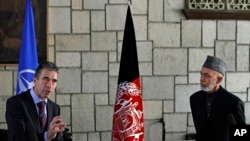ISLAMABAD —
Afghan President Hamid Karzai and NATO Secretary General Anders Fogh Rasmussen have called on Pakistan to do more to combat terrorism and condemned statements made last week by a leading Pakistan cleric apparently endorsing suicide attacks in Afghanistan. This latest spat between the neighboring countries could set back joint efforts to promote peace and reconciliation in Afghanistan.
Karzai criticized the comments, which were made on Afghan television by a prominent Pakistan cleric who had been part of efforts by religious leaders in the two countries to bring peace to Afghanistan, and are likely to sour an already strained relationship between the two countries.
Speaking at a press conference, Karzai said the statements made by Pakistan cleric Tahir Mehmood Ashrafi of the All Pakistan Ulema Council prove Islamabad supports suicide attacks as a tool of the Taliban's fight in Afghanistan.
We have always known that they supported suicide attacks, Karzai said, but now we have heard this directly from them. We hope that they [Pakistan] will be wise enough to take steps to change this situation.
NATO chief Anders Fogh Rasmussen, speaking at the same news conference, also condemned any suggestion that suicide attacks could be a legitimate tool of war. He urged the Pakistani government and military to step up their fight against terrorism and extremism.
"And I think the time has come for the Pakistani leadership - the military leadership as well as the political leadership - to realize that it is in their self-interest to ensure a peaceful development in Afghanistan," said Rasmussen.
Speaking to VOA by phone from Cairo, Ashrafi denied endorsing suicide attacks. He said a local Afghan TV interview had taken his remarks out of context. Ashrafi, a cleric seen as close to the Pakistani security establishment, has consistently come out against suicide attacks.
Pakistan's Foreign Ministry said in a statement that both Pakistan and the clerics have repeatedly condemned suicide attacks. It also said that any statements issued by individuals did not reflect the views of the Pakistani government.
Ashrafi said any planned talks between Pakistan clerics and Afghan clerics designed to bring the Taliban to the negotiating table and bring peace to Afghanistan are off until Karzai apologizes.
Moeed Yusuf, senior South Asia analyst for the United States Institute of Peace, says the setback over an apparent misunderstanding highlights how fragile the relationship is between Afghanistan and Pakistan.
"It should tell you how deep the mistrust still is and how difficult it is going to be for them to continue working together, because these hiccups are going to come," said Yusuf.
The religious talks had paralleled a series of high-level political and military meetings between the two countries aimed at kick-starting Afghan reconciliation talks as international troops withdraw from Afghanistan. Some Pakistani religious scholars are believed to have influence over the insurgency in Afghanistan.
Karzai criticized the comments, which were made on Afghan television by a prominent Pakistan cleric who had been part of efforts by religious leaders in the two countries to bring peace to Afghanistan, and are likely to sour an already strained relationship between the two countries.
Speaking at a press conference, Karzai said the statements made by Pakistan cleric Tahir Mehmood Ashrafi of the All Pakistan Ulema Council prove Islamabad supports suicide attacks as a tool of the Taliban's fight in Afghanistan.
We have always known that they supported suicide attacks, Karzai said, but now we have heard this directly from them. We hope that they [Pakistan] will be wise enough to take steps to change this situation.
NATO chief Anders Fogh Rasmussen, speaking at the same news conference, also condemned any suggestion that suicide attacks could be a legitimate tool of war. He urged the Pakistani government and military to step up their fight against terrorism and extremism.
"And I think the time has come for the Pakistani leadership - the military leadership as well as the political leadership - to realize that it is in their self-interest to ensure a peaceful development in Afghanistan," said Rasmussen.
Speaking to VOA by phone from Cairo, Ashrafi denied endorsing suicide attacks. He said a local Afghan TV interview had taken his remarks out of context. Ashrafi, a cleric seen as close to the Pakistani security establishment, has consistently come out against suicide attacks.
Pakistan's Foreign Ministry said in a statement that both Pakistan and the clerics have repeatedly condemned suicide attacks. It also said that any statements issued by individuals did not reflect the views of the Pakistani government.
Ashrafi said any planned talks between Pakistan clerics and Afghan clerics designed to bring the Taliban to the negotiating table and bring peace to Afghanistan are off until Karzai apologizes.
Moeed Yusuf, senior South Asia analyst for the United States Institute of Peace, says the setback over an apparent misunderstanding highlights how fragile the relationship is between Afghanistan and Pakistan.
"It should tell you how deep the mistrust still is and how difficult it is going to be for them to continue working together, because these hiccups are going to come," said Yusuf.
The religious talks had paralleled a series of high-level political and military meetings between the two countries aimed at kick-starting Afghan reconciliation talks as international troops withdraw from Afghanistan. Some Pakistani religious scholars are believed to have influence over the insurgency in Afghanistan.











